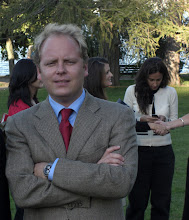Switching Sides?
After I quit my job In Bosnia, I stayed in Sarajevo for another 6 weeks to travel to Kosovo and Belgrade, but mainly to write. Because I did not work anymore, I had additional time to read as well, and one of the books I read was a book by Richard Holbrooke, called 'To End a War'. Holbrooke is a controversial person in Bosnia, and his book is met with sceptisism. He was the one who was the US 'peace broker', and the leading US diplomat/ politician who made the frame work and let the negotiations to the Dayton Agreement.
I found the book an easy read, and the writer, with all his personality flaws, fascinating. Fascinating, because he did what I want to be able to do in my career as well: to jump ships, and to keep on doing that. I.e.: he had a career in which he kept on jumping between the private and the public sector. In Holland this seems impossible; it is as if it is not seen as 'jumping ships', but 'switching sides'. Once you have chosen for the public sector, it is very hard to get into the private sector (although the other way around is possible, but if you want to go back in private after a while, it seems difficult). And that is a shame. I believe that they can both benefit from each other, and I believe that working for the public sector should be rewarded in the private sector (in the US you see very often that a high ranking banker becomes a secretary of treasure - think Henry Paulson, or think his predecessor, John Snow, who did public work while in private office); that is how it should be. My dad used to say that what happens in the US, happens 30 years later in Holland. Well, let's hope that that is true. Because Holbrook is about 36 years my senior. So there is hope- maybe in 30 years it is possible...
I found the book an easy read, and the writer, with all his personality flaws, fascinating. Fascinating, because he did what I want to be able to do in my career as well: to jump ships, and to keep on doing that. I.e.: he had a career in which he kept on jumping between the private and the public sector. In Holland this seems impossible; it is as if it is not seen as 'jumping ships', but 'switching sides'. Once you have chosen for the public sector, it is very hard to get into the private sector (although the other way around is possible, but if you want to go back in private after a while, it seems difficult). And that is a shame. I believe that they can both benefit from each other, and I believe that working for the public sector should be rewarded in the private sector (in the US you see very often that a high ranking banker becomes a secretary of treasure - think Henry Paulson, or think his predecessor, John Snow, who did public work while in private office); that is how it should be. My dad used to say that what happens in the US, happens 30 years later in Holland. Well, let's hope that that is true. Because Holbrook is about 36 years my senior. So there is hope- maybe in 30 years it is possible...

